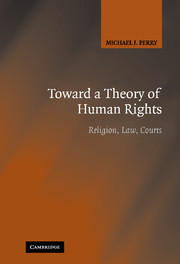Book contents
- Frontmatter
- Contents
- Acknowledgments
- Introduction
- TOWARD A THEORY OF HUMAN RIGHTS
- PART ONE THE MORALITY OF HUMAN RIGHTS
- 1 The Morality of Human Rights
- 2 The Morality of Human Rights: A Religious Ground
- 3 The Morality of Human Rights: A Non-Religious Ground?
- PART TWO FROM MORALITY TO LAW
- PART THREE FROM LAW TO COURTS
- Summation
- Notes
- Index
3 - The Morality of Human Rights: A Non-Religious Ground?
Published online by Cambridge University Press: 22 July 2009
- Frontmatter
- Contents
- Acknowledgments
- Introduction
- TOWARD A THEORY OF HUMAN RIGHTS
- PART ONE THE MORALITY OF HUMAN RIGHTS
- 1 The Morality of Human Rights
- 2 The Morality of Human Rights: A Religious Ground
- 3 The Morality of Human Rights: A Non-Religious Ground?
- PART TWO FROM MORALITY TO LAW
- PART THREE FROM LAW TO COURTS
- Summation
- Notes
- Index
Summary
Attempts to found a morality outside religion are similar to what children do when, wishing to replant something they like, they tear it out without the roots and plant it, rootless, in the soil. … [R]eligion is a particular relationship that man establishes between his own separate personality and the infinite universe, or its origin. And morality is the permanent guide to life that follows from this relationship.
Leo TolstoyThe masses blink and say: “We are all equal. – Man is but man, before God – we are all equal.” Before God! But now this God has died.
Friedrich NietzscheThere are many for whom Sarah's religious ground for the morality of human rights – her religious ground for insisting that every human being, even the Other, has inherent dignity and that we should live our lives accordingly – holds no appeal. For many of these, Sarah's ground holds no appeal precisely because it is religious.
What ground can someone give who is not a religious believer and, so, rejects Sarah's and any other religious ground? (We could also ask what ground one can give who, though a religious believer, professes religious beliefs different from Sarah's – a Buddhist, for example. But that's not the question that engages me here.) Can any non-religious ground bear the weight of the twofold claim, which both Sarah and the International Bill of Rights make, that every human being has inherent dignity and is inviolable.
- Type
- Chapter
- Information
- Toward a Theory of Human RightsReligion, Law, Courts, pp. 14 - 30Publisher: Cambridge University PressPrint publication year: 2006



